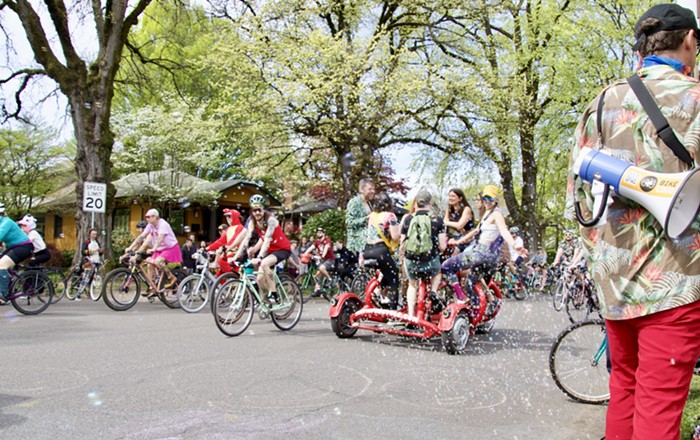Treacherous walking in this town typically brings to mind desolate, speed-fueled boulevards on the city's east end. Dangerous biking facilities have lately brought heat to SE Powell. But today, everyone's mad about the Burnside Bridge.
A proposal to hold a "memorial walk, ride, and protest" is going around active transportation circles following a crash this weekend where a driver ran up on the bridge's sidewalk—apparently after a "medical episode"—striking two pedestrians and killing one of them. George Ben Carlson, 36, died shortly after the crash. A 59-year-old Beaverton resident named Douglas Walker was the driver.
The tragedy is bringing out old grievances that Multnomah County hasn't done more to separate pedestrians and cyclists from motorists on the Burnside. It's the only one of the (walkable or bikeable) downtown bridges that doesn't separate cyclists and cars by at least a curb, though clearly that's not always enough.
The protest being considered today at 5 pm has shades of a "slow down" held last month after a cyclist was struck by a truck at SE Powell and 26th and lost a leg. Portland activist Dan Kaufman organize both events, but says it remains to be seen whether this evening's protest will draw enough people to effectively slowdown traffic on the Burnside (it doesn't help that it's scheduled at the same time as an organized demonstration against dangerous conditions on SW Barbur). The group BikeLoudPDX has signed on to the Burnside demonstration.
"Speeds are too fast," says Kaufman. "And how do you hit two people in broad daylight and just get to go home?"
The demonstration marks a continued bout of stepped-up activism over Portland's biking and walking infrastructure. And it comes as Portland City Council prepares to formally enshrine Vision Zero, the notion that preventing traffic deaths must be the primary concern for transportation planning.
The Portland Bureau of Transportation, as part of a recent $150,000 study, already pledged to "move toward zero traffic-related fatalities and serious injuries in the next 10 years." On Wednesday, city council will consider whether to formally adopt that ethos (which it will) and spend another $150,000 in state grant money to study how to make that work. This city loves $150,000 studies.
PBOT's fond of pointing out Portland's actually fairly safe, traffic-wise, for a bigger city. But according to CDC numbers the bureau uses (from 2009 data), we're doing worse than dense cities like Chicago, Washington, and New York in terms of traffic deaths per capita. Portland sees an average of 37 traffic-related deaths a year—12 of those pedestrians, two of them cyclists.
Portland's plan for Vision Zero isn't without its critics, but it's widely seen by walk/bike advocates as heartening progress. According to PBOT the forthcoming study will "be developed with a broad coalition of partners and include education, enforcement, and engineering strategies."














